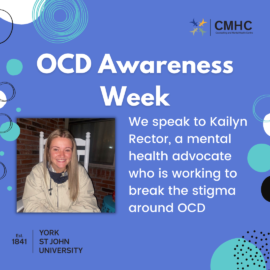Tourette’s Syndrome is a condition we have probably heard of, but is often misunderstood. I spoke to Richard about his Tourette’s and what he would like others to know about it.
What difference did it make to you to get a Tourette’s diagnosis?
I didn’t know what it was called as I was 13 when I got the diagnosis. Even from an early age I was showing ticks and they were extremely strong, but I didn’t know what the actual term was. When I received the diagnosis, I was surprised as my only knowledge of Tourette’s was the extreme form, which only 10% of sufferers have, as I’d seen with Pete Bennett from Big Brother. I had no idea that there was a physical form as well as a verbal form. The diagnosis was helpful as it laid out to me exactly what the issue was, and it meant I could do my own reading and research.
How does Tourette’s present for you?
Day to day, it still has a pretty prominent role in my life, which can be very frustrating. It definitely comes in waves. When I’m stressed, my verbal tics will come out a lot more and some physical ones too. Some tics reappear after 5 or 6 years for about a week and that’s all I’ll do, whether it’s tapping my leg, humming, scratching an area a certain amount of times… then they’ll gradually get better and I won’t have to worry about them for a while. It also gives me the urge to do dangerous things, even though I never go through with them, but it puts a strong ‘what if’ in your head at certain points like when you’re driving or you’re walking somewhere where there’s a big drop. That can be worrying but you have to learn to suppress those thoughts.
What would you like people to know about Tourette’s?
I want people to know a few things – I want there to be full knowledge of the disorder as it is. It’s only ever highlighted in popular culture by the extreme verbal cases, which are 10% of all sufferers. It is just as physical as it is verbal. The tics can be mistaken for OCD.
Another thing I’d want people to know is as much as it’s easy to have a laugh with it, Tourette’s is still a condition which causes massive mental strain for anyone suffering with it and in many cases those around them, TV shows often highlight the worst cases, and it can feel like it’s there to be laughed at. Living with Tourette’s means you can never ever switch that voice in your head off. You’re constantly losing a battle and trying to compromise with the voice telling you to satisfy that tic and get it over and done with so you can get on with your day, and it can eat away at you very slowly, especially when you’re stressed and all you want to do is switch off. I’d like people to know fully the strain it can have on a person, and hopefully people will empathise with Tourette’s sufferers and there will be less poking fun at the 10% extreme cases and more awareness around the 90% who live with it to a lesser extent, but still daily.
Thank you Richard for taking the time to share your experience with us, and help us to better understand Tourette’s syndrome.
If you want any more information about Tourette’s, then visit https://www.nhs.uk/conditions/tourettes-syndrome/ or https://www.tourettes-action.org.uk/
~
Author: Beth
~



